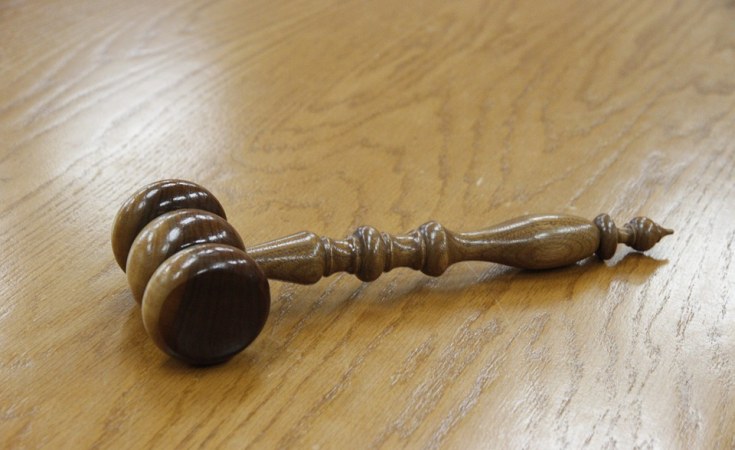At this rate, it means it will take a minimum of 11 years for the court to clear its docket if no new cases are filed before the court.
The Chief Judge of the Federal High Court, John Tsoho, said on Monday in Abuja that the court was able to finish roughly 13,000 cases in the previous 2021/2022 legal year, and transferred about 143,000 pending ones to the subsequent 2022/2023 legal year.
At this rate, it means it will take a minimum of 11 years for the court to clear its docket if no new cases are filed before the court.
Mr Tsoho spoke at a special court session to mark the beginning of the new 2023/2024 legal year of the court as well as the Golden Jubilee celebration of the court's establishment.
A legal year runs from July to September of the following year.
The Chief Judge said the court has 144, 910 cases pending at the end of 2022/2023 legal year. He said that a total of 142,755 (roughly 143,000) cases were pending at the end of the 2021/2022 legal year and were carried over to the 2022/2023 legal year.
''Within the last legal year, a total of 15,025 cases were filed, while the total number of cases disposed of was 12,870 (roughly 13,000).
''When the leftover of 2,155 cases are added to the total number of cases carried over from the previous year, being 142,755, we have a total of 144,910 cases pending at the end of the last legal year.
''This comprises 42,784 civil cases; 36, 061 criminal cases; 41,447 motions and 24, 618 fundamental rights enforcement applications,'' he said.
According to Mr Tsoho, the court remains a beacon of hope for all Nigerians seeking justice adding that it must remain a symbol of integrity and impartiality.
He reminded judges of the need to strive to be beyond suspicion.
''We must dispense justice with integrity and without bias and we must display utmost competence and courage as well as dispose of cases speedily.
''The court will surely rise to the challenges of the future with the same tenacity and commitment that has defined its path thus far.''
He said it was worthy of note that the court which started in Lagos with one court and five judges now had 38 judicial divisions with 95 judges.
''Since its inception, the court has recorded huge growth and is now a significant pillar in the hierarchy of the Nigerian judiciary.
''On this note, I want to particularly appreciate the current 95 judges of this court.
''I assure you that you are not here today by accident but by divine orchestration.
''I want to encourage you to stand steadfast and continue to dispense justice without fear or favour.''
Mr Tsoho also said it was pertinent to note that the court had faced difficulties just as it welcomed changes during the previous 50 years developing as a pillar of justice in the country.
''The court has had a significant influence on how the law is interpreted, how the legal system is shaped and how justice is dispensed and perceived.''
He gave the assurance that whatever challenge the court faced in the future, it would tackle it with tenacity and commitment adding that the next 50 years would be characterised by unwavering dedication to justice.
AGF, NBA speak
Also speaking at the occasion, the Attorney-General of the Federation and Minister of Justice, Lateef Fagbemi, enjoined the judges to reaffirm their commitment to upholding the ideals of justice, integrity and the rule of law.
''Let us envision a Federal High Court that will continue to be a beacon of excellence, the principles of ideas and a haven for jurisprudential growth,'' he said.
Mr Fagbemi, a Senior Advocate of Nigeria (SAN), represented by Tijani Gazali, also a SAN, commended the judges of the court for their dedication and commitment to the justice system while acknowledging the significant challenges faced by them.
According to him, while you are confronted with a voluminous workload, your diligence, dedication and unwavering commitment to upholding the law have remained resolute.
The President of the Nigerian Bar Association (NBA), Yakubu Maikyau, also commended the judges in their effort at delivering justice.
He said it was, however, disheartening that Nigerians, as a result of the action of some members of the bar, had continued to cast aspersions on the judiciary.
''We have failed in our responsibility in providing direction to the people of this country with respect to the things that the courts do,'' he said.
Mr Maikyau, therefore, called on members of the bench to ensure that appropriate punishment is meted out to any erring lawyer culpable of such misconduct.
Speaking on behalf of the body of Senior Advocates of Nigeria, Alex Izinyon, SAN, urged judges of the court not to be afraid to be dynamic.
''I call on you judges to be creative and stand tall to the call of duty. Where reforms are required, do not be afraid to take up innovations that will speed up the dispensation of justice,'' Mr Izinyon said.
The News Agency of Nigeria, (NAN) reports that the existence of the Federal High Court originated in 1973 as the Federal Revenue Court.
However, upon the return to civil rule and under the 1979 constitution, the Federal Revenue Court came to be known as the Federal High Court of Nigeria.


